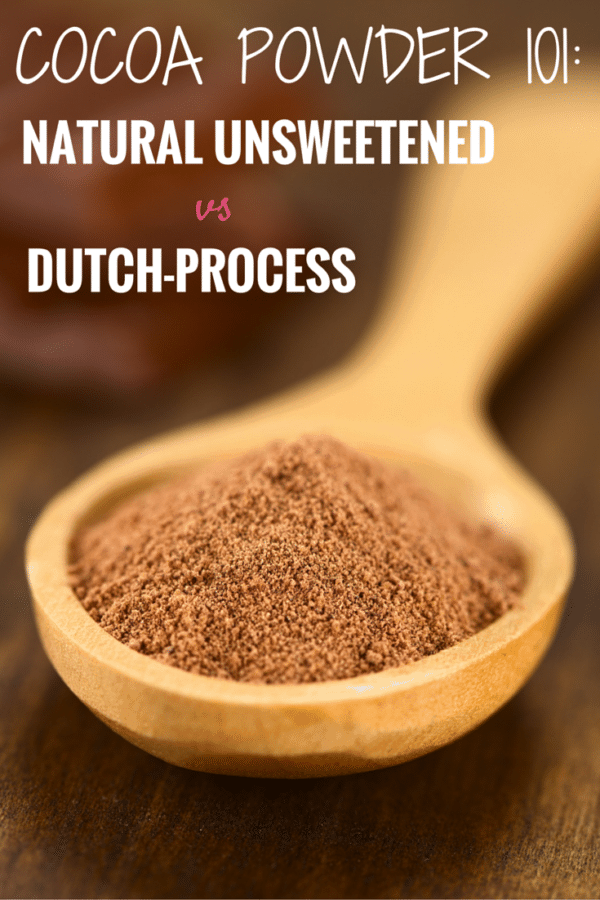Baking Basics: Cocoa Powder 101
I’m back with another Baking Basics session this week! Today we’re talking chocolate… more specifically, cocoa powder!
Cocoa powder is what is left over after cocoa butter has been extracted from cacao beans. There are two types of unsweetened cocoa powder: natural and Dutch-processed.
You may have noticed that a number of chocolate-based recipes here on the site call for one or the other – natural or Dutch-process cocoa. One of the most-asked questions I receive is whether one can be substituted for the other. Today we’re going to take the mystery out of the differences between the two and talk about when each one should be used.
Let’s go!
Dutch-Process Cocoa Powder
Dutch-process cocoa powder is also sometimes labeled as “treated with alkali” or “alkalized”. It is cocoa powder that has been washed in a potassium carbonate solution that neutralizes its natural acidity. The result is a richer cocoa powder that is darker in color and has a more mellow, less sharp-tasting flavor. It also dissolves more easily into liquids than natural cocoa powder. Since Dutch-process cocoa powder has been stripped of its acids and neutralized, you’ll often find it in recipes calling for baking powder.
Brand Recommendations: I’ve been using Valrhona Dutch-process cocoa powder for a number of years now – I really love the flavor! Another great brand is Droste, and Hershey’s also makes a Special Dark variety, which is part natural cocoa and part Dutch-process cocoa and found in most grocery stores.
Natural Unsweetened Cocoa Powder
Natural cocoa powder is usually labeled simply as “cocoa” or “unsweetened cocoa powder”. It has not had its acid stripped away, so it is lighter in color, acidic, bitter and has a very concentrated chocolate flavor. Since natural cocoa powder has all of its acid in tact, it is typically called for in recipes with baking soda. Natural cocoa powder is an acid, and baking soda is a base (science!), so the two react together to allow baked goods to rise properly.
Brand Recommendations: I am a big fan of the iconic Hershey’s natural unsweetened cocoa powder, and it’s available in pretty much every grocery store in the U.S. (plus, it was rated #1 in Cook’s Illustrated’s cocoa powder rankings!).
Troubleshooting Recipes
Are Dutch-process and natural cocoa powder interchangeable in a recipe? I always, always, always recommend following a recipe as written (see my initial Baking Basics post on 5 mistakes to avoid when preparing a recipe). Doing so gives you the best chance for success, especially if it’s your first time making the recipe. So, in a word, no. If you switch the cocoa powder, you’ll need to start playing around with the leavening agents, as well.
However, for recipes that do not use any leavening agents – things like sauces, frostings, puddings, hot chocolate, ice cream, some brownies – it’s perfectly fine to make substitutions based on your personal taste preference or what you have available.
What if a recipe only calls for ‘cocoa powder’? This is fairly common, especially in older recipes. I’ve found that most really old recipes (from church cookbooks, grandma’s index cards, etc.) are referring to natural cocoa powder, simply because that’s all that was available at the time.
However, you should always take a close look at the recipe. If it calls for a majority of baking powder, you should use Dutch-process cocoa. Conversely, if the recipe calls for mostly baking soda, then use natural cocoa powder.






This is a great series! I love how you break down the “why” in layman’s terms. I’ve learned details that will make the difference in my future recipes. A friend is just starting on his baking and cooking journey, and I will point him in this direction to help demystify the reasons behind the recipe instructions. Thanks!
Thanks for this clear information, I have loved it, en it has really helped alot, thanks so much 🤝🤝irene from Uganda 🇺🇬
I reduce the ingredients by nail-salonsnearme.com/
but that doesn’t tell me if I reduce cooking time. It also doesn’t tell me if I simply fill the converted recipe a little less full, to make up.
Try not to miss the potential chance to visit our page and find what you’re searching for with a solitary snap! cacao powder for sale
Wouldn’t it just be simpler to us the Hershey Special Dark in EVERY recipe given it is a mix of the two kinds of chocolate? That way you’d be covered on all the baking soda vs baking powder issues, and it would most likely not make that big of a difference?
Also, does cocoa (of any variety) ever go bad?
Hi Michelle, I’m sort of in the camp of using specialized products when they are called for. I think a true Dutch processed powder or a true natural unsweetened powder will each work better for their intended purposes than a blend. Just my opinion though! I’ve never used Hershey’s Special Dark.
Great to know! Loving these posts of yours. Very helpful! Thanks!
Great post Michelle.
Thank you for a helpful post. I use the natural cocoa but will have to look for the Dutch-processed and compare.
This is a great post Michelle, but I feel a little confused. Here in the UK we don’t tend to differentiate between Dutch processed cocoa and natural unsweetened. When ever a recipe calls for ‘cocoa powder’ or ‘Dutch processed’ I buy cadburys bournville Cocoa powder. I researched this brand and from what I gather it is Dutch processed.
The confusion I’m having is your description of natural unsweetened cocoa powder sounds like the bournville brand I’v been using all these years.
Not sure if you can help with this particular issue but I would hate to try a recipe and ruin it because of this. If you have any information or advice on this I would greatly appreciate it.
Thanks
I believe Cadbury’s Bournville cocoa is alkalized, aka Dutch processed. Most cocoa sold in the UK is. This might help: http://www.realfoods.co.uk/article/cacao-and-cocoa-your-questions-answered .
Hi Faye, It sounds like Cadburys cocoa is Dutch-process. If you don’t have any access to natural unsweetened cocoa powder, and a recipe calls for that as well as baking soda for the leavener, I would probably do a little research on how best to adjust the leavening agents to work with the Dutch-process cocoa powder you plan to use. There are some guidelines out there if you Google.
Oh man, and I thought I knew about baking! Thank you so much. This would explain the sometimes unpredictable nature of the chocolate cake I make of yours (from the PB overload cake) that sometimes just freaks out and bubbles, haha. But, it always tastes good. Buying some Dutch cocoa now! (I kept looking for it in stores, but no luck).
Thanks so much!
Thank you for explaining the difference in the two types of cocoa powder! This is super helpful. Really loved the explanation at the end on how to tell the difference if it’s an older recipe that doesn’t specify. :)
Thanks… I have been meaning to look all this up, but haven’t had the time. I just printed it out for my file.
David Leibovitz’s recipe for chocolate ice cream that you use, I use, and quite frankly the whole world should use, calls for bittersweet chocolate AND Dutch processed cocoa. It is quite possibly the best chocolate product ever.
Thank you so much for this clarification! Just yesterday I was searching different blogs looking for the differences in the two. I also really appreciate your brand recommendations. I have never used the Dutch processed cocoa, I can’t wait to give it a try!
Hear, hear! I really appreciate the information and recommendations. You rock!
I don’t see recipes very often that call for Dutch Process. I do keep a container in my pantry for “just in case”, only to realize it just sits there unopened.
Do you have any Dutch Process recipes you’d like to share?
Also, where do you purchase the Valrhona Brand? I’ve never seen it on the shelves in the store.
I’m enjoying your Baking Basics Series. Always something new to learn when it comes to the “science of baking”.
Thank you.!
Hi Brenda, I purchase the Valrhona cocoa powder from either Amazon (link above) or Chocosphere (sometimes the price is cheaper). As for recipes using Dutch-process cocoa powder, here are some recipes from the site:
https://www.browneyedbaker.com/chewy-brownies/
https://www.browneyedbaker.com/giant-chocolate-peanut-butter-chip-cookies/
https://www.browneyedbaker.com/peanut-butter-cup-overload-cake/
https://www.browneyedbaker.com/chocolate-mousse-recipe/
https://www.browneyedbaker.com/buckeye-brownies/
What a lovely post! Thank you so much for all of these helpful facts. Also… I’ve been hearing more about ‘raw cacau’ lately, and that this powder is also somehow different. Do you know anything about that? Thanks!! xox
Hi Alice, Cacao powder (raw cacao) is made by cold-pressing unroasted cocoa beans, while cocoa powder is raw cacao that’s been roasted at high temperatures. They are virtually identical, but the health food community claims that there are more antioxidants and health benefits to the raw cacao. You can use it interchangeably in a recipe calling for natural cocoa powder, but NOT for one calling for Dutch-process.
This is such a timely post for me….I’ve been scratching my head a long time on the difference! I’m actually bookmarking this at the top of my computer. I know in the grander scheme of things there are bigger problems, but this was one of mine!! hehe.
Oops. I have confused Dutch processed and unsweetened cocoa, which means when the recipe called for Dutch processed, I used unsweetened thinking they were the same thing. So, thank you very much for clearing up that confusion.